Juho Pohjalainen's Blog: Pankarp - Posts Tagged "chaos"
Bad Parenting
I think I finally tackled an analogy I've been working on for a while now.
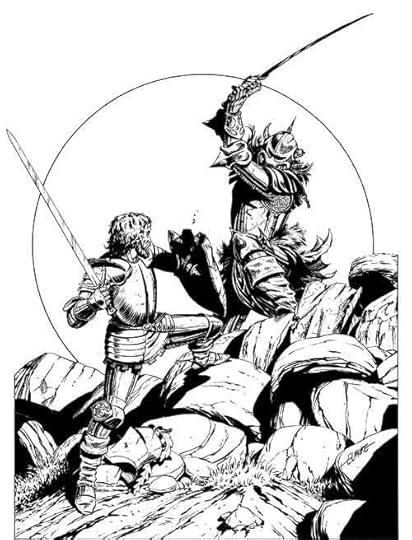
Picture you had some terrible parents. They're constantly at odds with each other. It's not for certain that you're biologically theirs (though many believe you are), or that they didn't have you by accident.
A lot of people would not even be aware of these parents existing, and go along with their lives as if this was the case.
But others would take sides.
Let's say you went along with your dad. You agreed with him in everything, partly because you believe what he says, and partly because he gives you great rewards and weird powers. It's up to you which one of these is more important. In turn, you shun your mother and oppose her wherever you can.
Then it gets wonky. The thing is, you yourself are made of your two parents, more or less in equal amounts. But the more you go along with your dad, the less like your mother you resemble.
Say you had once her eyes? Well, not anymore. Her very genetic code gets slowly but steadily erased out of you. Eventually there's nothing but your dad in you.
This is what it would be like to follow either the concept of Law or Chaos too far. To think that the world would be better off with full order, or disorder, and forget that it needs both to exist. By mortal reckoning, the champions of either aspect are pretty legitimately insane.

Peal, in this analogy, would be well aware of his parentage, but choose to avoid both sides. Whenever one of the two is getting too powerful, he punches them in the groin. Peal is a problem child.

Picture you had some terrible parents. They're constantly at odds with each other. It's not for certain that you're biologically theirs (though many believe you are), or that they didn't have you by accident.
A lot of people would not even be aware of these parents existing, and go along with their lives as if this was the case.
But others would take sides.
Let's say you went along with your dad. You agreed with him in everything, partly because you believe what he says, and partly because he gives you great rewards and weird powers. It's up to you which one of these is more important. In turn, you shun your mother and oppose her wherever you can.
Then it gets wonky. The thing is, you yourself are made of your two parents, more or less in equal amounts. But the more you go along with your dad, the less like your mother you resemble.
Say you had once her eyes? Well, not anymore. Her very genetic code gets slowly but steadily erased out of you. Eventually there's nothing but your dad in you.
This is what it would be like to follow either the concept of Law or Chaos too far. To think that the world would be better off with full order, or disorder, and forget that it needs both to exist. By mortal reckoning, the champions of either aspect are pretty legitimately insane.

Peal, in this analogy, would be well aware of his parentage, but choose to avoid both sides. Whenever one of the two is getting too powerful, he punches them in the groin. Peal is a problem child.
Published on September 03, 2019 16:30
•
Tags:
analogies, chaos, cosmic-forces, eternal-conflicts, fantasy, law, musings, parents, settings
Just what IS fate, anyway?
This stuff comes up a fair bit in fantasy of any kind, and occasionally science fiction and other genres. The idea that some things are just meant to happen. That the main character is the Chosen One, destined to defeat evil. That the villain is destined to a horrendous demise. That two particular strangers are fated to meet by a road one day. You get the idea.

But it's a whole lot less common for these works to even try and explain the nature of this fate. Why does it want this guy to kill the bad guy? What does it care about some people having a chance meeting? What are its goals, its motives, and where did it come from? And what does it all mean for the opposing concepts of choice and free will?
Most of the time the whole thing just feels like a story convenience. A way to easily explain out all those little coincidences that get the plot running, without wasting too much time in it. But I've been thinking about it a lot lately and so I thought I'd try and cut it up to see what's inside.

From the way it's usually explained in-universe, it strikes to me as a sort of a cosmic breath or pulse, where all things go the way they're supposed to. Rivers run downhill, moons orbit planets and planets orbit suns, sun shines, birds sing, and a magically-talented little girl survived the destruction of her kingdom to meet with a Witcher in a peasant hut. If these things would not happen, then it would cause discord: little skipping of a beat or two, ragged breath or a cough, the sort. No one necessarily wants any of this stuff to happen, it's just all the things in the cosmos, great and small, going on as they would. You can fight it, but only if you know what you're fated to do: otherwise you'll just end up going exactly into its arms.

The opposite interpretation is that there is a higher power, or many higher powers, actively meddling in the worldly affairs - sometimes getting into scraps with one another - messing with people, empowering their own champions, throwing around curses, and anyone that can't handle it is just going to be swept aside like they were nothing. What's free will, is just what choice there is left after all the greater beings have made their plays. A child should not disobey their parents; a peasant would be unwise to defy his king; and even the greatest hero must tread lightly when challenging the gods. You can make it work - you can succeed, even get out of it with your skin - but most likely you'll pay a heavy price for your foolishness.
I like to employ both. The ones more Lawfully-aligned prefer the former explanation, as it makes them feel like they were a part of some greater whole; the Chaotics subscribe to the latter, for they can then seek a sponsor for their pursuit of power and greatness.
Peal thinks both are a bunch of nonsense. In his own words:
"If the river had the will to move uphill, it could. If Titan fancied to revolve the other way for a change, she might. I've seen the former happen and heard of the latter - and taken part in men revolting against kings, and helped children stand up to their parents, even given a Lord of Chaos the slip.
What you call 'Fate' is nothing more than the easy way out - the path of least resistance. An excuse to justify not making any decisions of your own, and going with the flow, the mob. To hell with that. Stop for a moment. Think it through. Seize control over your own life. Walk ever the thorniest path."
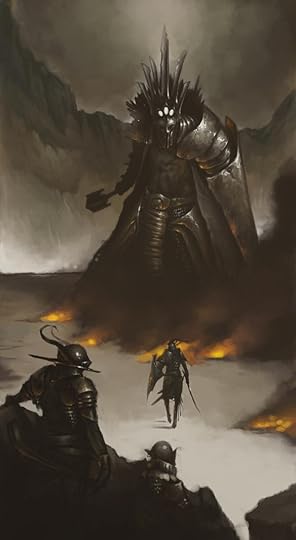

But it's a whole lot less common for these works to even try and explain the nature of this fate. Why does it want this guy to kill the bad guy? What does it care about some people having a chance meeting? What are its goals, its motives, and where did it come from? And what does it all mean for the opposing concepts of choice and free will?
Most of the time the whole thing just feels like a story convenience. A way to easily explain out all those little coincidences that get the plot running, without wasting too much time in it. But I've been thinking about it a lot lately and so I thought I'd try and cut it up to see what's inside.

From the way it's usually explained in-universe, it strikes to me as a sort of a cosmic breath or pulse, where all things go the way they're supposed to. Rivers run downhill, moons orbit planets and planets orbit suns, sun shines, birds sing, and a magically-talented little girl survived the destruction of her kingdom to meet with a Witcher in a peasant hut. If these things would not happen, then it would cause discord: little skipping of a beat or two, ragged breath or a cough, the sort. No one necessarily wants any of this stuff to happen, it's just all the things in the cosmos, great and small, going on as they would. You can fight it, but only if you know what you're fated to do: otherwise you'll just end up going exactly into its arms.

The opposite interpretation is that there is a higher power, or many higher powers, actively meddling in the worldly affairs - sometimes getting into scraps with one another - messing with people, empowering their own champions, throwing around curses, and anyone that can't handle it is just going to be swept aside like they were nothing. What's free will, is just what choice there is left after all the greater beings have made their plays. A child should not disobey their parents; a peasant would be unwise to defy his king; and even the greatest hero must tread lightly when challenging the gods. You can make it work - you can succeed, even get out of it with your skin - but most likely you'll pay a heavy price for your foolishness.
I like to employ both. The ones more Lawfully-aligned prefer the former explanation, as it makes them feel like they were a part of some greater whole; the Chaotics subscribe to the latter, for they can then seek a sponsor for their pursuit of power and greatness.
Peal thinks both are a bunch of nonsense. In his own words:
"If the river had the will to move uphill, it could. If Titan fancied to revolve the other way for a change, she might. I've seen the former happen and heard of the latter - and taken part in men revolting against kings, and helped children stand up to their parents, even given a Lord of Chaos the slip.
What you call 'Fate' is nothing more than the easy way out - the path of least resistance. An excuse to justify not making any decisions of your own, and going with the flow, the mob. To hell with that. Stop for a moment. Think it through. Seize control over your own life. Walk ever the thorniest path."

Published on February 16, 2020 15:48
•
Tags:
chaos, clockwork, cosmic-balance, destiny, explaining-stuff, fate, law, pawns
Ruminations on the Common Tongue
Any self-respecting fantasy setting has numerous different languages and means of communication, split between different cultures and nations, but more often than not there's also the "common tongue" to act as a bridge - and to make things reasonably simple for the poor author to manage. Much as I'd like to avoid this trope and bring a great many different languages to bear instead, make it a common issue for travellers... well, my stories tend to be rather too inscrutable as it is, I've been told.
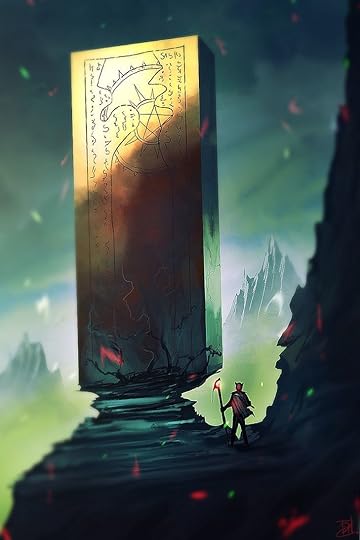
I'm dropping racial languages, though. All elves everywhere in the setting don't speak their own common "elvish". That's dumb.
So where did this common tongue come from? Many linguists suggest that it was first brought forth by an ancient and now forgotten civilization, immensely advanced and powerful, likely through means of genetic engineering: it's often encountered even in worlds that have never had any kind of outside contact in any recorded history. It's written as English for the convenience of our present-day readers and authors, but in truth it would resemble something like Esperanto - very easy to learn even in the unlikely case you were not born with innate understanding.
Strangely, it tends to also bring along an instinctive dislike - even fear and disgust - of other languages: any other spoken tongue tends to sound guttural and harsh and hideous in the ears (or other appropriate organs) of the speaker of the Language of Law. Even those that learned the language later in life, tend to pick up this prejudice. It takes some conscious effort to overcome. Why is that? Some have theorized that this ancient civilization was once at war with something else, something that simply would not accept taking up the common tongue: perhaps they instilled the subconscious hostility as a defense mechanism, or some manner of automated tribalistic response? Who can say.
Other things to note: the common tongue is spoken virtually everywhere in the galaxy of Ormuzd, whereas the other galaxy - Ahriman - has many places where it's never been heard before, especially at the farther edge. This suggests that the civilization in question would have originated from the former. More curious still, it tends to be associated with and accompanied by the vast and immensely powerful mechanical beings, the Lords of Law: beautiful and serene, golden and divine, ever the companions and guides of all civilization, ever the staunch opposers of taint and corruption. Meanwhile, in the opposite case you get the forces of Chaos: the black and ever-shifting beings, like viruses of all reality, always and everywhere seeking change and destruction for its own sake.
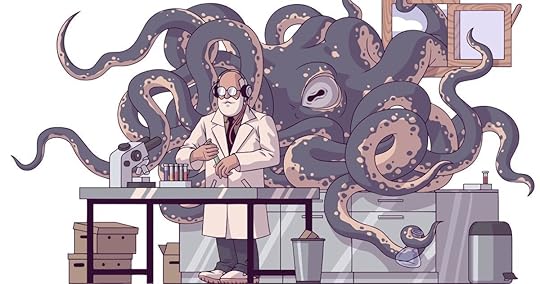
In certain less-developed worlds these forces are worshipped as gods. Even the more advanced civilizations sometimes do. But at the core of Khimari Confederate, computer scientists have found many similarities between their programs and the forces of Law, as well as many others between malign computer viruses and the forces of Chaos. Observations of some feral-world "sorcerers" also draw connections between their art, and instinctive computer programming.
Investigation continues.

I'm dropping racial languages, though. All elves everywhere in the setting don't speak their own common "elvish". That's dumb.
So where did this common tongue come from? Many linguists suggest that it was first brought forth by an ancient and now forgotten civilization, immensely advanced and powerful, likely through means of genetic engineering: it's often encountered even in worlds that have never had any kind of outside contact in any recorded history. It's written as English for the convenience of our present-day readers and authors, but in truth it would resemble something like Esperanto - very easy to learn even in the unlikely case you were not born with innate understanding.
Strangely, it tends to also bring along an instinctive dislike - even fear and disgust - of other languages: any other spoken tongue tends to sound guttural and harsh and hideous in the ears (or other appropriate organs) of the speaker of the Language of Law. Even those that learned the language later in life, tend to pick up this prejudice. It takes some conscious effort to overcome. Why is that? Some have theorized that this ancient civilization was once at war with something else, something that simply would not accept taking up the common tongue: perhaps they instilled the subconscious hostility as a defense mechanism, or some manner of automated tribalistic response? Who can say.
Other things to note: the common tongue is spoken virtually everywhere in the galaxy of Ormuzd, whereas the other galaxy - Ahriman - has many places where it's never been heard before, especially at the farther edge. This suggests that the civilization in question would have originated from the former. More curious still, it tends to be associated with and accompanied by the vast and immensely powerful mechanical beings, the Lords of Law: beautiful and serene, golden and divine, ever the companions and guides of all civilization, ever the staunch opposers of taint and corruption. Meanwhile, in the opposite case you get the forces of Chaos: the black and ever-shifting beings, like viruses of all reality, always and everywhere seeking change and destruction for its own sake.

In certain less-developed worlds these forces are worshipped as gods. Even the more advanced civilizations sometimes do. But at the core of Khimari Confederate, computer scientists have found many similarities between their programs and the forces of Law, as well as many others between malign computer viruses and the forces of Chaos. Observations of some feral-world "sorcerers" also draw connections between their art, and instinctive computer programming.
Investigation continues.
From Chaos, Order
I've been reading early parts of Dragon Ball and One Piece lately, as well as the first couple books of Discworld. They all have something in common - they're all pretty crazy and wild and fast compared to what would come later. Things are way more in flux, you never quite know what happens next, there's not as much structure or narrative expectations yet. But there would be.

It's hardly unusual: few stories know what they want to be from the very start, and they tend to flounder about a bit and need to search for their own voice and style. From there on things begin to grow more coherent, as recurring characters and character motivations and personalities pop out of the primordial slime of creation, and as the setting itself begins to manifest and hold itself together. You get more involving storylines, more drama and tension, more call-backs, more structure, more order.
There's a lot to like in this kind of growth, and more often than not a story cannot survive if it does not take this step. But still, one often comes to miss those early wild days. The age of chaos and Sword & Sorcery in Discworld, when the realm was more dominated by strange magical landscapes and high adventure, before it was tamed and brought low by realism; the sheer quick pace of Dragon Ball, before the story demanded to slow things down for the sake of building things up; all the goofy sidetrip islands and their characters in One Piece, before the plot got kicked in such a high gear that we no longer could spare the time for such.
I hope it will never come to that for me. I hope to always keep a little bit of the essential Chaos in my works.


It's hardly unusual: few stories know what they want to be from the very start, and they tend to flounder about a bit and need to search for their own voice and style. From there on things begin to grow more coherent, as recurring characters and character motivations and personalities pop out of the primordial slime of creation, and as the setting itself begins to manifest and hold itself together. You get more involving storylines, more drama and tension, more call-backs, more structure, more order.
There's a lot to like in this kind of growth, and more often than not a story cannot survive if it does not take this step. But still, one often comes to miss those early wild days. The age of chaos and Sword & Sorcery in Discworld, when the realm was more dominated by strange magical landscapes and high adventure, before it was tamed and brought low by realism; the sheer quick pace of Dragon Ball, before the story demanded to slow things down for the sake of building things up; all the goofy sidetrip islands and their characters in One Piece, before the plot got kicked in such a high gear that we no longer could spare the time for such.
I hope it will never come to that for me. I hope to always keep a little bit of the essential Chaos in my works.

Published on January 17, 2021 07:59
•
Tags:
cerebus-syndrome, chaos, early-installment-weirdness, finding-your-own-voice, narrative-structure, order
Redemption doesn't feel so hot anymore
Used to be I could love it when a bad guy turned good. A long meaningful character arc where they realize what a terrible person they've been, and set forth to turn a new leaf. The worse they'd been before, the better it could be.
Nowadays... I don't really feel it anymore. I can no longer believe in it. Because in the internet, everybody is terrible.
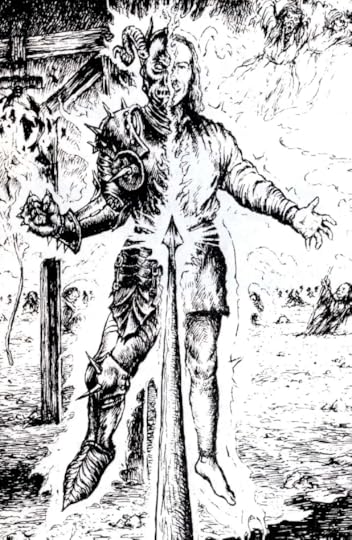
Ideologies worn on their sleeves and taken to the absolute extreme: everyone burying themselves into bunkers covered in spikes, absolutely refusing to budge, yet ready to fling rocks and bombs at other, equally immoveable, bunkers. Even the nominally "good" people - the ones preaching for love and tolerance and progress, loving the tales where evil is peacefully redeemed - frothing at their mouths as they rage at other people, shouting and screaming and wishing for bodily harm... absolutely blind to the irony of it. Even the slightest disagreement can spark a row... or even if the two people actually fully agree, but one of them expresses themselves poorly. People that could otherwise be best of friends, driven at each other's throats. Everyone everywhere is always ready to pick a fight and to have a go at it, never realizing how there's nothing to be won or no one that can be convinced.
And in the off-chance someone does in fact put their past behind them and becomes a better person, someone is always ready to dig up their sordid history and get a good lynch mob going. No redemption is allowed to stand.
No one comes across as any good or pure in this: all faith in humanity, crumbling away like ancient ruins to desert winds. Bloody festering rifts forming between all peoples of mankind, out of nothing and for no reason. I've watched it grow increasingly worse for years now. It's asinine.

Clearly we need to tone down our expectations.
For this year's NaNoWriMo, I will write an Enemy Mine situation where a bunch of Good Guys and Bad Guys, usually at each other's throats, are forced to work together to survive in the face of a far greater foe. They learn to appreciate each other better by the end of it, some of them become friends, and everyone gets a character arc and grows as a person... but no one is redeemed. The bad guys are at the end of it still as bad as at the start - possibly even worse, with their character growth only making them more efficient villains.
The takeaway here will not be a great moral or ideological one, but rather simply learning to coexist. Learning to tolerate people even when you disagree with them on some heavy subjects. Learning to cooperate with them for a common cause. Learning to be polite even when you think someone's a terrible person.
Because you have to share this world with these people whether you like it or not, and nothing you say to them is likely to convince them out of their ideals, especially not if you're being a dick about it. The heroes of this story do the whole internet fight thing at the beginning, and nearly get killed for their efforts. After that they learn better.
Of course, the two or so people likely to read the story will already know this lesson, so it's rather preaching to the choir. But at least I can vent a little.
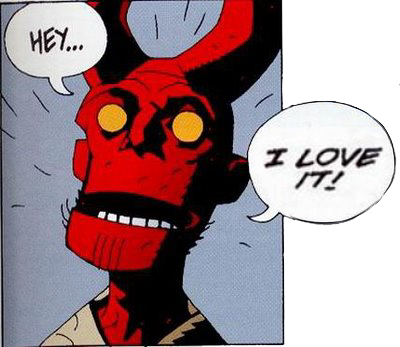
Nowadays... I don't really feel it anymore. I can no longer believe in it. Because in the internet, everybody is terrible.

Ideologies worn on their sleeves and taken to the absolute extreme: everyone burying themselves into bunkers covered in spikes, absolutely refusing to budge, yet ready to fling rocks and bombs at other, equally immoveable, bunkers. Even the nominally "good" people - the ones preaching for love and tolerance and progress, loving the tales where evil is peacefully redeemed - frothing at their mouths as they rage at other people, shouting and screaming and wishing for bodily harm... absolutely blind to the irony of it. Even the slightest disagreement can spark a row... or even if the two people actually fully agree, but one of them expresses themselves poorly. People that could otherwise be best of friends, driven at each other's throats. Everyone everywhere is always ready to pick a fight and to have a go at it, never realizing how there's nothing to be won or no one that can be convinced.
And in the off-chance someone does in fact put their past behind them and becomes a better person, someone is always ready to dig up their sordid history and get a good lynch mob going. No redemption is allowed to stand.
No one comes across as any good or pure in this: all faith in humanity, crumbling away like ancient ruins to desert winds. Bloody festering rifts forming between all peoples of mankind, out of nothing and for no reason. I've watched it grow increasingly worse for years now. It's asinine.

Clearly we need to tone down our expectations.
For this year's NaNoWriMo, I will write an Enemy Mine situation where a bunch of Good Guys and Bad Guys, usually at each other's throats, are forced to work together to survive in the face of a far greater foe. They learn to appreciate each other better by the end of it, some of them become friends, and everyone gets a character arc and grows as a person... but no one is redeemed. The bad guys are at the end of it still as bad as at the start - possibly even worse, with their character growth only making them more efficient villains.
The takeaway here will not be a great moral or ideological one, but rather simply learning to coexist. Learning to tolerate people even when you disagree with them on some heavy subjects. Learning to cooperate with them for a common cause. Learning to be polite even when you think someone's a terrible person.
Because you have to share this world with these people whether you like it or not, and nothing you say to them is likely to convince them out of their ideals, especially not if you're being a dick about it. The heroes of this story do the whole internet fight thing at the beginning, and nearly get killed for their efforts. After that they learn better.
Of course, the two or so people likely to read the story will already know this lesson, so it's rather preaching to the choir. But at least I can vent a little.

Published on September 07, 2021 14:49
•
Tags:
chaos, coexistence, darth-vader, evil, fighting-fantasy, good, hatred, hellboy, internet, law, moral-relativism, nanowrimo, national-novel-writing-month, pamcakes, prejudice, redemption, star-wars-infinities, voivod
Pankarp
Pages fallen out of Straggler's journal, and others.
Pages fallen out of Straggler's journal, and others.
...more
- Juho Pohjalainen's profile
- 352 followers



